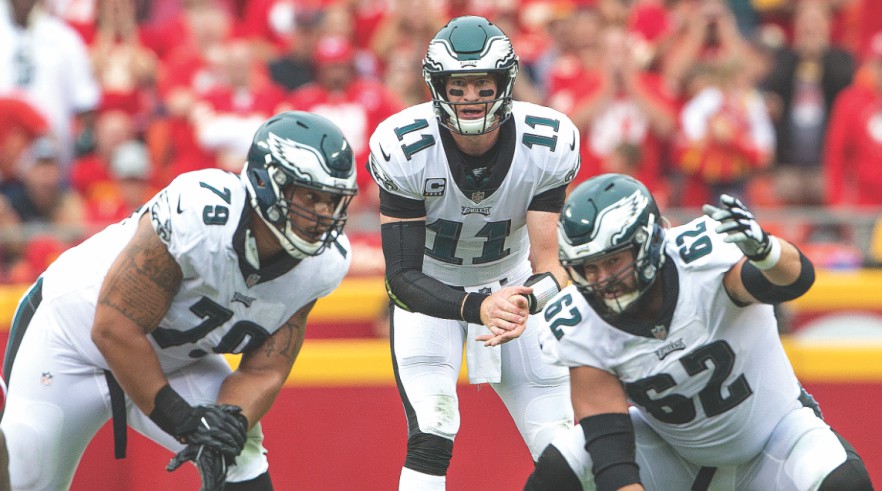Gambling Spread Nfl
A common phrase heard from experienced football bettors is: “I don’t bet teams, I bet numbers.”
Picking the winning team in a football game isn’t easy. It’s even more difficult to place a winning wager on a game that involves a point spread or total.
Bettors look for key numbers. These numbers in football betting (and to a lesser extent basketball) are the most common margin of victory of the final score or the point totals. These key numbers are accessible using years of final score data that can be found fairly easily online, as you’ll see shortly.
Visit ESPN to view NFL odds, point spreads and moneylines from this week's games. For example: Dallas –9.5 (–110) or Washington +9.5 (–110) means you’d wager $110 for the chance to win an additional $100 if you bet on the spread. Find NFL odds, point spreads, and betting lines for the 2020-2021 football season. Visit FOXSports.com for this week's top action! The NFL Las Vegas Odds are listed in order of rotation and those numbers are generated and produced by the sportsbooks. Above each matchup and rotation is the Time of the game, which is subject to change. All game times are Eastern Standard Time. One of the best features on the NFL Vegas Odds is the Open Line.
When betting on NFL games there are two specific key numbers that bettors keep an eye on. These two specific margins of victory occur much more often than any others. The most frequent margin of victory in both college and pro football is 3 points. The second most frequent margin of victory is 7 points.
These are key numbers for both sportsbook operators and bettors. In this article we’ll look at the two key numbers in football for betting full game point spreads since this is the most popular type of wager. We’ll also take a look half points, buying points to avoid a key number, if there are certain key numbers for totals, and the possibility of the key numbers becoming obsolete someday.
NFL margin of victory
The margin of victory is the number of points a team wins by. The margin of victory may mean something different to football teams than bettors. Teams might be proud of winning by a lot of points. They can keep pushing the score up or lay off as the game comes to a close.
The losing team could take offense to how they were beaten and seek retribution next time they play. Likewise, they could just see the loss as a bad day at the office. This is one possible short term effect of the margin of victory in a football game. Bettors could use this emotion as part of their handicapping a football game.
The margin of victory for football games is useful for sportsbooks in setting a point spread. Bookmakers and bettors both use this long term data and possible short term implications. At the same time, football bettors use the information when handicapping a game and placing a wager.

There is so much data — good and bad — available today that it’s easy to get lost in the information. Key numbers are one data point that is always useful for placing a wager.
Betting the point spread
Moneyline wagers are relatively simple. Just pick a team and the wager will either win or lose. Point spreads are a different monster. Sportsbooks can create a point spread for a game so that each team playing has an almost even chance of winning the game.
A good point spread should attract bettors on both sides of a game. While sportsbooks don’t necessarily want equal money on both sides, they don’t want the money entirely on one side for every football game. This puts the book at risk of major losses.
Sportsbook operators know the key numbers and use them to their advantage. You’ll often the line on a football game stay at 3 or 7 for longer than other point spreads. Sportsbooks will add vigorish (vig) as much as possible before moving instead of moving off the number.
During football games, you might see the point spread remain at 3 or 7 but the vig moves from -100 to -120 then to -130 before moving to either 2.5 or 3.5. The extra vig gives the sportsbook a little more of an edge in case the margin of victory lands in the key number.
If bettors place wagers with a higher vig, the casino won’t lose as much if the final score lands on the key number. Understanding the key numbers could be the difference between placing a winning or losing wager.
What are the key numbers?
The most common margin of victory at the end of both college and pro football games is 3 points. According to Wizard of Odds, the probability that an NFL game finished with a 3 point margin is around 14.5%.

The next closest margin of victory is 7 points. Games from 2006 through Week 1 of the 2018 season finished with a 7 point margin 9.2% of the time. This large sample size covers a total of 3,220 games.
During this sample, nearly 1 in every 4 games finished with a margin of victory of 3 or 7 points. The actual number of games to end with a margin of victory of exactly 3 or 7 points was 23.7%. That’s a lot of games ending on those key numbers, and that’s why they are so important when wagering on football.
For a better comparison here’s the probabilty for every margin of victory from 0 points to 21 points in NFL games since 2006 from Wizard of Odds.
0 = 0.2%
1 = 3.7%
2 = 3.8%
3 = 14.5%
4 = 5.2%
5 = 3.4%
6 = 6.2%
7 = 9.2%
8 = 3.6%
9 = 1.7%
10 = 5.6%
11 = 2.5%
12 = 1.5%
13 = 2.9%
14 = 4.8%
15 = 1.5%
16 = 2.1%
17 = 3.1%
18 = 2.3%
19 = 1.1%
20 = 2.4%
21 = 3.2%
22 and higher = 15.7%
Understanding why these are key numbers isn’t difficult but it’s important. Since more football scores are worth 3 points or 7 points (6 points for a touchdown plus 1 for an extra point) it’s easy to see why the margin of victory falls at each of these numbers.
The probability for the margin of victory in college football is similar but slightly different.
Keep an eye on the hook
A “hook” is a slang term for a half-point. When looking at the key numbers, the hook is a half-point away from the 3- and 7-point margin of victory.
The main hook to keep an eye is around the 3-point line. These point spreads are 2.5 and 3.5. The second hook to look for is around the key number of 7. These point spreads are 6.5 and 7.5.
Since nearly 25% of games end with a margin of victory of 3 or 7, finding a point spread just off that number could be the difference between placing a winning bet with the hook or getting a push with the flat number.
Shopping around different sportsbooks comes in handy when looking for an extra half-point on a game. If a bettor can’t find a preferred half point spread, they may choose to buy points. Depending on the sportsbook a half point will add another 10% to the vig. For example, buying a half point from 3 to 2.5 or 3.5 will change the odds from -110 to -120.
A winning wager on a 3-point spread at -110 would pay $100 for every $110 wagered. Buying a half point would mean that the bettor will have to wager $120 to win that same $100. It’s not much on a single wager but it adds up over time.
Key numbers in the future
NFL rules change every season. One relatively new rule that is already starting to affect the key numbers is the extra-point distance. Kicking and extra points used to take place with the ball starting at the two yard line. This was almost a guaranteed point for NFL teams.
Since 2015, NFL extra points begin at the 15 yard line. The pseudo 33-yard field goals are no longer thought of as a guarantee. This rule is already changing the game. In the past couple of years, more coaches are going for two-point conversions instead of attempting an extra point.
This three year sample is too small to gauge the true effect of the new extra point distance on the key numbers. However, kickers are missing more extra points and coaches are skipping the extra point. The days could be ending for 7 as a key number since touchdowns might be worth 6 or 8 points more often in the future.
Key numbers for NFL totals
There are key numbers for NFL totals but they’re a bit more widespread than key numbers for point spreads. The Wizard of Odds research shows that final score totals land on a variety of numbers.
Some key numbers to keep an eye on for totals betting are 43, 44, 41, and 37. Of the 3,220 games recorded, the total landed on each of these key numbers at least 120 times (37) but no more than 126 times (43), respectively.

The next level of key numbers for NFL totals are 51, 47, 40, and 33. During the same period the total landed exactly on these numbers between 119 times (51) and 102 times (33), respectively.

See Full List On Sportsline.com
While there are key numbers for NFL totals, the final score isn’t contained to just two key numbers.